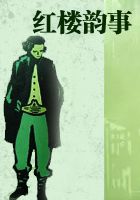Dudevant at Nohant, resigning her fortune, and proceeded to Paris, where she was hard pressed to find a living. She endeavoured, without success, to paint the lids of cigar-boxes, and in final desperation, under the influence of Jules Sandeau--who became her lover, and who invented the pseudonym of George Sand for her--she turned her attention to literature. Her earliest work was to help Sandeau in the composition of his novel, "Rose et Blanche" Her first independent novel, "Indiana," appeared at the close of 1831, and her second, "Valentine," two months later. These books produced a great and immediate sensation, and she felt that she had found her vocation. In 1833 she produced "Lebia"; in 1834 the "Lettres d'un Voyageur" and "Jacques"; in 1835 "Andre" and "Leone Leoni." After this her works become too numerous and were produced with too monotonous a regularity to be chronicled here. But it should be said that "Mauprat" was written in 1836 at Nohant, while she was pleading for a legal separation from her husband, which was given her by the tribunal of Bourges, with full authority over the education of her children. These early novels all reflect in measure the personal sorrows of the author, although George Sand never ceased to protest against too strict a biographical interpretation of their incidents. "Spiridion"(1839), composed under the influence of Lamennais, deals with questions of free thought in religion. But the novels of the first period of her literary activity, which came to a close in 1840, are mainly occupied with a lyrical individualism, and are inspired by the wrongs and disillusions of the author's personal adventures.
The years 1833 and 1834 were marked by her too-celebrated relations with Alfred de Musset, with whom she lived in Paris and at Venice, and with whom she quarrelled at last in circumstances deplorably infelicitous. Neither of these great creatures had the reticence to exclude the world from a narrative of their misfortunes and adventures; of the two it was fairly certainly the woman who came the less injured out of the furnace. In "Elle et Lui" (1859) she gave long afterward her version of the unhappy and undignified story. Her stay in Venice appears to have impressed her genius more deeply than any other section of her numerous foreign sojournings.
The writings of George Sand's second period, which extended from 1840to 1848, are of a more general character, and are tinged with a generous but not very enlightened ardour for social emancipation. Of these novels, the earliest is "Le Compagnon du Tour de France" (1840), which is scarcely a masterpiece. In the pursuit of foreign modes of thought, and impelled by experiences of travel, George Sand rose to far greater heights in "Jeanne" (1842), in "Consuelo" (1842-'43), and in "La Comtesse de Rudolstade" (1844). All these books were composed in her retirement at Nohant, where she definitely settled in 1839, after having travelled for several months in Switzerland with Liszt and Mme. d'Agoult, and having lived in the island of Majorca for some time with the dying Chopin, an episode which is enshrined in her "Lucrezia Floriani" (1847).
The Revolution of 1848 appeared to George Sand a realization of her Utopian dreams, and plunged her thoughts into a painful disorder. She soon, however, became dissatisfied with the result of her republican theories, and she turned to two new sources of success, the country story and the stage. Her delicious romance of "Francois le Champi"(1850) attracted a new and enthusiastic audience to her, and her entire emancipation from "problems" was marked in the pages of "La Petite Fadette" and of "La Mare au Diable." To the same period belong "Les Visions de la Nuit des les Campagnes," "Les Maitres Sonneurs,"and "Cosina." From 1850 to 1864 she gave a great deal of attention to the theatre, and of her numerous pieces several enjoyed a wide and considerable success, although it cannot be said that any of her plays have possessed the vitality of her best novels. The most solid of the former was her dramatization of her story, "Le Marquis de Villemer"(1864), which was one of the latest, and next to it "Le Mariage de Victorine" (1851), which was one of the earliest. Her successes on the stage, such as they are, appear mainly due to collaboration with others.
In her latest period, from 1860 to 1876, George Sand returned to her first lyrical manner, although with more reticence and a wider experience of life. Of the very abundant fruitage of these last years, not many rank with the masterpieces of her earlier periods, although such novels as "Tamaris" (1862), "La Confession d'une Jeune Fille"(1865), and "Cadio," seemed to her admirers to show no decline of force or fire. Still finer, perhaps, were "Le Marquis de Villemer"(1861) and "Jean de la Roche" (1860). Her latest production, which appeared after her death, was the "Contes d'une Grand'mere," a collection full of humanity and beauty. George Sand died at Nohant on the 8th of June, 1876. She had great qualities of soul, and in spite of the naive irregularities of her conduct in early middle life, she cannot be regarded otherwise than as an excellent woman. She was brave, courageous, heroically industrious, a loyal friend, a tender and wise mother. Her principle fault has been wittily defined by Mr.
Henry James, who has remarked that in affairs of the heart George Sand never "behaved like a gentleman."E. G.
PREFACE
When I wrote my novel /Mauprat/ at Nohant--in 1846, if I remember rightly--I had just been suing for a separation. Hitherto I had written much against the abuses of marriage, and perhaps, though insufficiently explaining my views, had induced a belief that I failed to appreciate its essence; but it was at this time that marriage itself stood before me in all the moral beauty of its principle.















